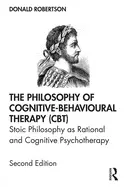
The Philosophy of Cognitive-Behavioural Therapy - by Donald Robertson
ISBN: 036721914XDate read: 2020-09-24
How strongly I recommend it: 4/10
(See my list of 430+ books, for more.)
Go to the Amazon page for details and reviews.
After learning about Cognitive-Behavioural Therapy from the “… for Dummies” book, I wanted to see how it was applied to Stoicism. The book did not disappoint, and is a good reinforcement of the mindset.
my notes
Consider civilization as having begun when man first did things to further the well-being of other men.
CBT is concerned with helping clients to deal with irrational or disturbing emotions, and to cultivate rational, healthy, and proportionate ones in their stead.
Behavioural experiments and empirical observation.
Beliefs should be tested out in practice, in the laboratory of our personal experience.
Cognitive activity affects behavior. Cognitive activity may be monitored and altered. Desired behavior change may be affected through cognitive change.
Do the following:
1. monitor negative automatic thoughts, or cognitions
2. evaluate the relationship between thoughts, feelings, and actions
3. carefully evaluate the evidence for and against distorted or maladaptive cognitions
4. generate alternative cognitions and to substitute them for the negative ones
5. identify and modify underlying dysfunctional assumptions and beliefs which predispose to negative automatic thoughts.
Enchiridion: “Men are disturbed not by things, but by the views which they take of them”.
Hamlet: “There's nothing good or bad but thinking makes it so”.
The role of responsibility, rationality, and self-disciplined observation of one's mind as a means of modifying irrational emotions and achieving psychological well-being
Human emotions are based on ideas. Control of most intense feelings may be achieved by changing one's ideas.
Nothing lies completely in their power except their judgements and desires and goals.
Nothing outside the mind or volition can, of its own nature, constrain or frustrate us unless we choose to let it
Epictetus begins by explaining the Stoic view that our judgements and opinions are pre-eminently within our power to control, whereas external events, especially sources of wealth and reputation, are ultimately in the hands of Fortune. Hence, the Stoic should always strive to cope with adversity by having ready “at hand” precepts that remind him “what is mine, and what is not mine, what is within my power, and what is not” (Discourses, 1.1.21). Indeed, Epictetus goes as far as to define Stoicism itself as the study of this distinction
Learn what things are our own, and what are not.
Though it may have taken a lifetime to study the subtle implications of Stoic philosophy, its basic tenets were intended to be summed up in a few words.
Emotional disturbance is the result of mindlessly becoming absorbed in external events, being overly attached to sensory pleasure, wealth, and the praise of others, and overly anxious about pain, poverty, and criticism.
Epictetus compares the mind to a bottle of water with a ray of light shining through it, representing our perception of external events. If the water is shaken, the light is refracted and disturbed. Likewise, when our mind, judgements, and perceptions are internally disturbed, external events look disturbing to us. We project our feelings on to external events. The sage sees everything in the same light because his mind is constant and he refuses to attach undue importance to anything outside his control.
If you want anything good, get it from yourself.
The attainment of self-awareness and self-control.